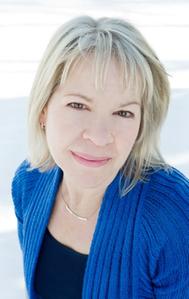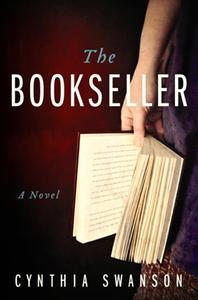
|
|
| photo: Glenda Cebrian Photography | |
Cynthia Swanson is a writer and mid-century modern designer. She has published short fiction in 13th Moon, Kalliope, Sojourner and other periodicals; her story in 13th Moon was a Pushcart Prize nominee. She lives in Denver, Colo., with her husband and three children. The Bookseller is her first novel (our review is below).
When Cynthia Swanson headed off to college, her intention was to become an architect. Like many writers, she believed she needed a "practical" career, and since she'd always loved design, architecture seemed like the perfect fit. But writing wouldn't leave her alone. As she explained, "Writing always came first. The design came later, but it pulled everything together. It's not an accident that Lars [the ideal husband of Katharyn Andersson, one of Swanson's protagonists in The Bookseller] is an architect. I live vicariously through my characters."
The house that Katharyn and Lars live in has similarities to the Denver home Swanson and her husband remodeled in what she terms "respectful mid-century design" style. This approach influenced the vivid imagery in The Bookseller. "My design philosophy is simple: respect the integrity of the original home." By learning and intimately understanding the integrity of her 1958 tri-level, she could authentically re-create the era's architecture in her novel.
But early 1960s wasn't the original setting for The Bookseller. For her debut novel involving a woman who learns--years later--why she was stood up for a date that would have altered her life, Swanson started by setting it in contemporary Denver. "About 30% into the first draft, I realized a present-day Kitty would have approached her situation much differently," Swanson said. "For one thing, she would have had a lot more resources: searching online, looking at Google Earth. Communication would have been a lot more instant. If he didn't show up, she would have texted him. She never would have gone eight years without knowing."
That left Swanson backing up to a time when information wasn't so readily available. But that could have been any number of eras, so why the 1960s? "I love this time period. I've started a second novel, and it's set in the same era," Swanson said. It also turned out to be a great decade in terms of Kitty's occupation.
Kitty Miller and her best friend Frieda own a small bookstore that has been relatively successful until recently. The loss of a city streetcar route near the shop has hurt business, and the co-owners are discussing the possibility of taking their enterprise to a suburban mall. Swanson points out, "It's like a metaphor for today. In the 1960s, they were fighting against flight out to the burbs, now the bookstore flight is to the big-box stores and online."
 Books published in the early 1960s also worked well for Swanson's story. There are references to Ray Bradbury's Something Wicked This Way Comes and Rachel Carson's Silent Spring, among other well-known titles. "I did a lot of research to see what was on the bestseller lists and things like that," Swanson said. "It was fun to do the research and then develop the character through the use of books. In every draft I added more books--my editor said readers love to read books about books--but I would be lying if I said I read every one of them."
Books published in the early 1960s also worked well for Swanson's story. There are references to Ray Bradbury's Something Wicked This Way Comes and Rachel Carson's Silent Spring, among other well-known titles. "I did a lot of research to see what was on the bestseller lists and things like that," Swanson said. "It was fun to do the research and then develop the character through the use of books. In every draft I added more books--my editor said readers love to read books about books--but I would be lying if I said I read every one of them."
As a single career woman, Kitty had time to read all those books. The flip side of Kitty is Katharyn, a married mother of three who leaves her career to stay home with her children. Have the struggles of women--choosing between families and careers--changed all that much from the 1960s? Swanson said, "Women still struggle with that choice, but I believe there are a lot more expectations of women today. Before it was cut and dried; you picked one or the other. These days you'd better be able to do both. However, now women can be more creative with options that weren't there before, like flex schedules or working from home. And in either era, it's very different for women than men."
Swanson knows a bit about juggling those responsibilities. She, like Katharyn, is the mother of three young children. Swanson explains that while The Bookseller is her first published novel, she's always been working on something of a longer nature. "I never considered The Bookseller for a short story, there was always too much to it. I started it after a long hiatus where I thought my creativity was gone; I was so excited to have a viable idea."
But her writing career began when Swanson was a single woman, more like Kitty Miller. Her role as a wife and mother completely altered her writing approach. "Before children, if I thought of a short story idea, I'd take a break [from the longer work] and write the story. After marriage, if I thought of a short story idea, I'd take notes and come back to it. I was finding time to write every single day, and I was afraid if I took a break from the novel I would lose the momentum."
One way Swanson kept that momentum going was with the promise of research. While she said, "I love research, it's so fun," she also knows it can be a trap. One can easily fall into the black hole of continuing to learn more and more without writing anything. So for Swanson, "It's the carrot I dangle out there for myself. When I'm writing a first draft, I do very little research. I get my story idea down and then go back and do the research." Approaching research in this manner helped The Bookseller in a number of ways. When Swanson met with the Women's Book Club at her church, the older members informed her that Kitty would not be wearing pantyhose as Swanson had first described her--they hadn't been invented yet. So Kitty ended up wearing stockings instead.
Additionally, Swanson was looking for a good reason why Kitty and Frieda's long-successful bookstore would have struggled in this period. Through her research she learned of the streetcar changes in the neighborhood where Swanson had established the shop.
Autism plays a role in The Bookseller, and Swanson wrote the first draft knowing a family dealing with this issue. Her research verified what she already knew about mothers feeling guilty, and she discovered the fortunately short-lived "refrigerator mother" theory on autism.
The research-after-the-fact approach seems to have worked exceptionally well for Swanson. She could face the sort of "what if" question her protagonist confronts: What if she'd approached her writing with a different style? But Swanson said her outlook on it is firm: "Appreciate what you've got. It's not going to be perfect, but there are benefits either way." So she's moving on to a new novel and maybe more short fiction; a true freelance writer, she said, "I never turn anything down." First, though, she'll take a few minutes to enjoy the excitement of her debut novel. --Jen Forbus of Jen's Book Thoughts

